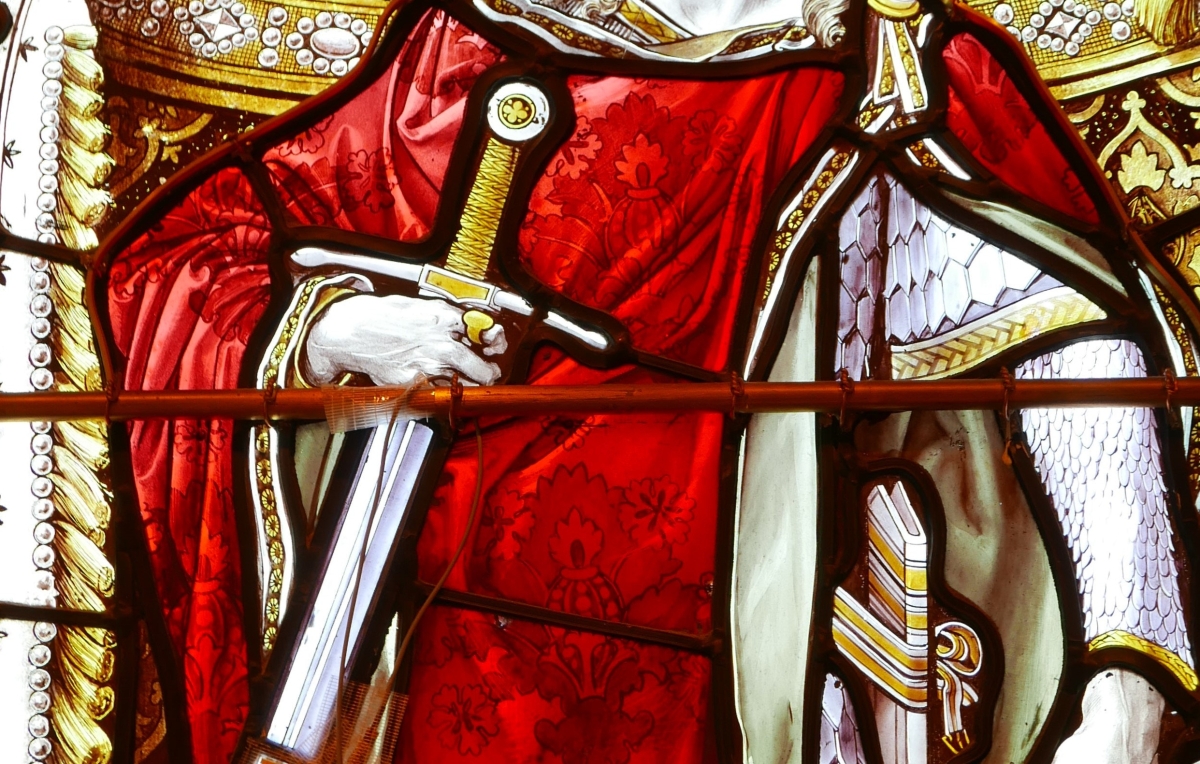I preached this sermon on Sunday, October 22, 2023 at St. Anne Episcopal Church in West Chester, OH. The lectionary text cited is Matthew 22:15-22. This sermon was offered as part of the parish’s annual pledge/fundraising campaign.
Over the past couple of months, I’ve gotten together with many of you at a series of meet-and-greet events. I’ve loved the opportunity for us to learn more about one another and to hear from you about your hopes and dreams for St. Anne. There are still a couple more of these on the calendar, so I hope to see you soon if you haven’t made it to one yet.
At a few of these, I have been able to share a bit of my own story—how I came to be in The Episcopal Church and how that eventually led me into the priesthood. I am not going to retell that whole story this morning, but a piece of it has been on my mind this week as I’ve been reflecting on both our Gospel for today and our annual pledge campaign to fund St. Anne’s mission and ministry in the coming year, because one common thread in all of these things—my own story, the Gospel story, and in St. Anne’s ongoing story—is that sometimes we discover that God is not at all who we thought God was, or that God does not in any way resemble our longstanding assumptions…and that this can be very good news.
When I was in college, I drifted away from church; or it might be more accurate to say I ran away. My reasons were personal, but not entirely unique; I think many of us, at one juncture or another, begin to question our foundational understandings of who we are and how the world works and what is ultimately true. And that is exactly what happened to me.
And so, in my mid-twenties, I found myself in an awkward position: I had spent a number of years feeling very unsure about everything I had been taught about faith and religion, and yet the hunger for meaning, for purpose, for belonging to something greater than myself, would not leave me alone. I longed to be part of a community that was committed to something deeper than just a hobby or a political opinion or a worldview; I wanted to engage the big questions of life and death and love and eternity, but I didn’t want to be given an ultimatum as to how best to answer those questions, and I had always understood religion as a place of ultimatums—believe this, think this, be like this, or else you are not part of this.
And yet, despite my trepidation, God still haunted me, like the lingering memory of a lost love, and so one day I found myself slipping into the back pew of an Episcopal church near my house, tentative, uncertain, hopeful. I followed along as best I could; I stood and sat and kneeled like Episcopalians do. When it came time to recite the Creed, I only said parts of it, because I didn’t know what I believed anymore, and I didn’t want to lie.
And yet, when the time came, I nonetheless went up to the rail for communion, praying that if there was a God who still loved me, that he would forgive my confusion and my reticence and still meet me there in the bread and the cup. I prayed that I would not be punished for having so many doubts, for being wayward and unsure of my commitments. And I reached out my hands, almost breathless, waiting to see what would happen.
I think that the stakes of that moment, at least as I perceived them, were similar to the stakes of the question posed by the Pharisees and the Herodians to Jesus in this morning’s gospel passage. They have ulterior motives, of course, but they are asking, fundamentally, where Jesus’ loyalties lie, and whether he is all in for God or for Caesar, as if the two are comparable forces competing for the same spiritual and material resources.
Although they don’t say so explicitly, there is, woven into their question, the idea that God, like Caesar, is an emperor of sorts—a figure or a force demanding fealty and submission. And to be fair to them, this is an image of God that is embedded in much of our Scripture, since these are texts that were shaped and recorded by a society accustomed to rulers with absolute authority.
This is the same understanding of God that I had when I approached the communion rail: a God who literally sat on a throne, ready to suss out whether I had been loyal, whether I was willing to pay the price of my authenticity in order to receive his beneficence.
But what Jesus knew, and what he came to proclaim to the world, is that God is not comparable to Caesar. God is not like an emperor at all; God’s power is from the ground up, not from the top down. And though we still try to put a crown on God’s head and though there are still those who try to fashion God’s Word into a sword rather than a healing balm, Jesus continues to dismiss such posturing. And he continues to console those among us who fear that we are too doubtful, too wayward, too lost to be part of this.
He says, render unto Caesar your questions of punishment and debt and power.
But render unto God what is God’s—the deepest longing of your heart to be welcomed unconditionally, to be loved without reservation, to be invited into building and sustaining something kind, something beautiful, something true.
And so you know what happened when I reached out my hands to receive communion on that Sunday so many years ago? Nothing. In the best possible way, nothing. God did not send down a thunderbolt and smite me for having run away. God did not send an angry Episcopalian to berate me for not reciting the whole Creed. God did not punish me for having doubts and questions.
God simply fed me, and that was its own sort of answer.
Because, as I realized, perhaps for the first time that day, God is not Caesar, demanding conformity and unthinking allegiance, asking “are you worthy, are you certain, are you pure?” No, the God revealed in Christ is more like a person standing on the front porch to welcome you home, saying, “I’ve missed you. Come on in; you look like you need something to eat.”
And I did eat, and I am still eating, responding to that hunger that could not be satisfied anywhere else. And from that first Sunday onward, I knew that if this was what church could be, then it was worth everything I had to give.
I know, from hearing so many of your stories already, that some of what I am talking about overlaps with your experience of the Episcopal Church and of St. Anne in particular. I know that in this place, many of you have come to the realization that God is not that which we were once taught to fear, and that the point of all this is not to arrive at some untroubled belief in God, but to discover that God believes in us, and that God always will, no matter how far we run or how long we wander.
And I want you to consider what a rare and precious treasure this is—that there is a place in this world, as polarized and fractured as it is, where people are welcomed to come as they are, to be held in community, to be invited to grow in faith while still leaving space for tough questions, for doubt, for mystery, and for a certain acceptance that we don’t have all the answers.
I know that, because of what I discovered about God that first Sunday in an Episcopal church, I decided to pledge my life to this vision and embodiment of Christianity. And because of the ways that St. Anne so joyfully and passionately pursues that same vision, both within our walls and beyond them, I will be pledging a substantial amount to help fund the mission of this parish in the coming year.
I want to do that not just because of all the good things already taking place here, but because I know that somewhere out there, maybe just down the road, there are people just like I was on that Sunday so long ago—no longer able to endure the notion of the God of empire, yet still longing to find a place of welcome, longing to belong to and to help build something kind and beautiful and true. Longing to hear a voice saying, I’ve missed you. Come on in. You look like you need something to eat.
This is that place. Let’s make sure they find it. Let’s be ready for them when they do.


What a wonderful outpouring of personal faith and your struggle, your longing Fr Phil. And yes, we “mainline” Christians need to shout it from the rooftops that we have experienced a God who is not Caesar, someone so much more than an emperor, someone worth searching for. Thank you Phil
LikeLike